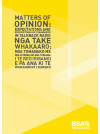This report presents the findings from a comprehensive three-stage research programme designed to inform and guide the Broadcasting Standards Authority and broadcasters.
Methodology
Qualitative and quantitative research project exploring expectations listeners have of broadcasting standards in relation to radio
- Phase 1 – Review of Panorama data
- Phase 2 – Focus groups (regular listeners of talkback radio) in Auckland and Wellington with 20 participants
- Phase 3 – Survey of 503 regular listeners of talkback radio supplemented with two questions of non-listeners in Nielsen’s Omnibus survey
Key Results
The talkback audience
- Talkback enthusiasts (most frequent listeners) are more likely to be male, over 60 years of age, retired and heavy consumers of radio in general
- Enthusiasts are more likely to listen between midnight and 6am, an otherwise unpopular time for listening. Lunch time and evening time slots are also less popular time slots
- The most common places to listen are at home or in a motor vehicle, and the station most likely to be listened to is Newstalk ZB
- Listeners are attracted to talkback radio because of the different perspectives gained from the range of opinions represented, the entertainment it provides and the stimulating discussion
Audience participation
- Three in every ten listeners attempt to participate in the discussion, but on an infrequent basis (majority call less than once or twice a month). Talkback enthusiasts are more likely to have called in an attempt to participate in the discussion
- Around one in six listeners end up participating in the discussion
- The main reasons for not calling are that listeners simply enjoy listening to others discuss the topics, or that they think someone with a similar point of view will call
Broadcasting standards vs freedom of expression
- When benchmarked against other radio broadcasts (news and current affairs/documentaries), greater leniency is expected for talkback radio for all areas of broadcasting standards
- Standards around accuracy are of most importance to talkback listeners, and a role for both hosts and callers was identified in maintaining standards in this area
- However, overall there is a greater expectation on hosts than callers for maintaining standards
- When played back to respondents, content involving host’s poor treatment of callers was more likely to be considered a breach in standards
- Talkback enthusiasts are less likely to consider content of this nature a breach in standards, suggesting that the more one listens to talkback radio the more accustomed one is to this type of content

